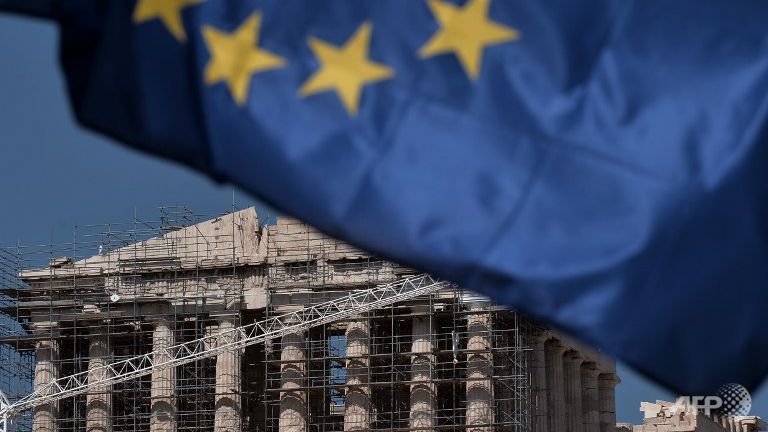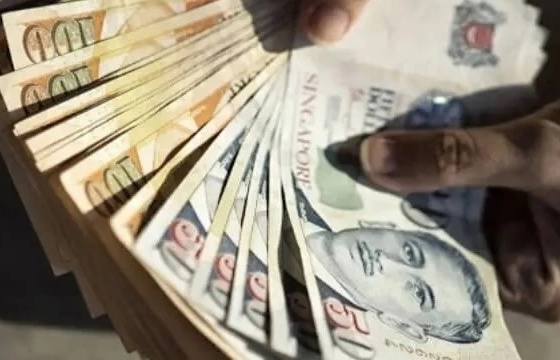Greece needs US$55b more from EU: IMF
 |
| The Parthenon temple is seen behind an European Union flag in in Athens on Jul 2, 2015. (Photo: AFP/Louisa Gouliamaki) |
WASHINGTON: Greece needs €50 billion (US$55 billion) over the next three years, including €36 billion more from EU lenders, to stabilise its finances even under existing creditor plans, the IMF said on Thursday (Jul 2).
In a new report that raised pressure on its European partners in Greece's rescue, the International Monetary Fund acknowledged a huge deterioration in the country's prospects in recent months.
It slashed Greece's 2015 economic growth forecast to zero per cent, from 2.5 per cent forecast in April.
That estimate, too, was made before Greece broke off talks with official creditors last weekend and ordered capital controls and its banks shut for a week, all of which has further stifled economic activity.
The new "preliminary draft" analysis of Greece's finances highlighted the deterioration that has taken place since Prime Minister Alexis Tsipras and his anti-austerity Syriza party took power at the beginning of 2015.
"Very significant changes in policies and in the outlook since early this year have resulted in a substantial increase in financing needs," it said.
The report cited a €9 billion shortfall in the government's privatisation commitments under the IMF-European Union bailout programmes, while noting its only vague commitments to further sell off state assets to raise money.
In addition, due to a lowering of targets for the government's fiscal surplus, the analysis said there is a shortfall of another €13 billion.
Other previously unforecast financing needs arise from the government's own mounting commitments for unpaid pensions and tax refunds, from costs associated with the liquidity support operations for banks, and from lower income due to the stall of growth momentum in recent months.
In sum, a senior IMF official told journalists, "Greece faces significantly larger financing needs going forward than we thought last year."
WARNING OF 'HAIRCUTS'
Existing proposals by the Greek side and EU creditors do not address those needs, he stressed, speaking on the condition of anonymity.
Indeed, he noted that the estimate of an additional €50 billion in funding covers the three years from October this year, and was based on the assumption that existing support from the EU and IMF would continue through this summer.
But since the analysis was crafted, talks on extending the EU program past Jun 30 broke down, and Greece defaulted on its loans from the IMF, forcing the Fund to freeze loan disbursements.
Without those programs through the middle of the year, the IMF official said, the actual additional funding needs are more than €60 billion.
On top of the need for more cash, the IMF said creditors needed to double the maturity of existing official EU loans to Greece to 40 years, with a 20-year grace period.
The official said that proposal is not simply a way to avoid other politically hard choices for the Greeks and their creditors.
"This is a dramatic move," he stressed. "It would be very misleading to say the IMF is trying to get an easy way around this debt sustainability problem."
In an alternate scenario, the report also warned that if Greece's medium-term growth remains a low one per cent a year and if the government's fiscal surplus targets are cut, European creditors could be forced to accept as much as €53 billion in "haircuts" on their loans to Greece.
The IMF official admitted the EU forecasts of Greece's additional needs are lower than the Fund's. But in any case, he said: "We are saying that we cannot go to our board unless we have a solution to this problem."
"We are asking the Greeks to do very, very difficult things. We are asking the Europeans to do things that are very, very difficult for them also."
What the stars mean:
★ Poor ★ ★ Promising ★★★ Good ★★★★ Very good ★★★★★ Exceptional
Latest News
More News
- Thailand seeks to promote digital training (November 04, 2024 | 16:14)
- Indonesia attracts foreign investment in technology sector (November 04, 2024 | 16:08)
- Tropical storm Trami leaves at least 24 people dead in Philippines (October 24, 2024 | 17:36)
- Singapore grants conditional approval for solar power import from Australia (October 24, 2024 | 17:27)
- ASEAN digital economy set to reach $2 trillion by 2030 (October 22, 2024 | 15:08)
- Thailand asks Laos to waive visa fee at border checkpoints to boost tourism (October 21, 2024 | 17:23)
- Laos pledges to continue efforts to empower girls (October 21, 2024 | 17:17)
- Chinese electric vehicle maker to build plant in Indonesia (October 21, 2024 | 17:12)
- Vietnam Elevator Association introduces Elevator Safety Application to the world (October 18, 2024 | 09:00)
- A taste of the future - the go-to spot at the Worldchefs Congress & Expo 2024 (October 15, 2024 | 16:11)



















 Mobile Version
Mobile Version